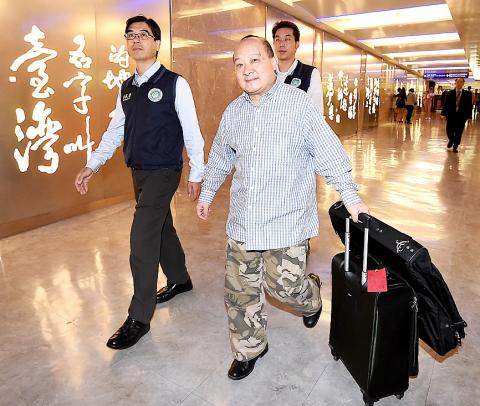Visiting Chinese academic Li Yi (李毅) was deported from Taiwan yesterday morning because he was scheduled to make a public speech, which would have breached the terms of his entry permit, the National Immigration Agency (NIA) said.
Li was found at a hostel in Nantou County at 12:35am and was deported on China Airlines Flight 601 from Taiwan Taoyuan International Airport to Hong Kong at 7:25am, the NIA said.
Entering Taiwan under the guise of sightseeing to advocate unifying Taiwan with China by means of force is “worse than terrorism,” Premier Su Tseng-chang (蘇貞昌) told reporters.

Photo: Chu Pei-hsiung, Taipei Times
“Taiwan is a free, democratic and open country. We welcome all to visit Taiwan... However, if you come here to advocate unification through armed invasion under the pretext of sightseeing, you are no different from a terrorist,” Su said.
Li’s deportation was proportionate; he had it coming, Su said, adding that there was no comparison to the treatment of Taiwanese human rights advocate Lee Ming-che (李明哲), who was sentenced to five years in a prison in China’s Hunan Province.
Minister of the Interior Hsu Kuo-yung (徐國勇) said Li should not have planned activities of a political nature or advocated the destruction of Taiwan’s sovereignty.
There are limitations to freedom of speech, Hsu said, adding that statements advocating unification with China by means of force are not welcome in Taiwan.
Li in August last year applied for a multiple-entry permit to visit Taiwan for tourism purposes and arrived in Taiwan on Tuesday, NIA Director-General Chiu Feng-kuang (邱豐光) said yesterday.
Li was asked to leave the country because of his intentions to engage in an activity inconsistent with the purpose of his entry permit, Chiu said.
Shortly before his departure yesterday, Li posted a “departure message” on Chinese social media platform WeChat, saying that the two sides of the Taiwan Strait will “eventually be unified.”
After landing in Hong Kong, he said in a radio interview that freedom of speech in Taiwan allows him to discuss topics such as “reunification,” whether by peaceful means or by force.
Li, who has advocated the use of force to unify Taiwan and China, was invited by the Chinese Unity Promotion Party (CUPP) to speak at a forum titled “Cross-Strait Peaceful Unification and Development,” in Taichung today.
In the speech, he was expected to address China’s proposal to implement a “one country, two systems” framework in Taiwan, the CUPP said on Facebook on Thursday.
Given his intentions to engage in activity of a political nature while on a tourist permit, and considering that his pro-unification speech might have jeopardized national security and social stability, Li would be asked to leave Taiwan, the NIA said on Thursday, citing the Regulations Governing the Approval of People of the Mainland Area Visiting Taiwan for Purposes of Tourism (大陸地區人民來台從事觀光活動許可辦法).
Li has been declared persona non grata and would be subject to restrictions if he returns to Taiwan, the Ministry of the Interior said.
Taichung City Councilor Huang Shou-ta (黃守達) of the Democratic Progressive Party said that Li has said that once the Chinese People’s Liberation Army crosses the Taiwan Strait, Taiwanese can forget about independence.
Additional reporting by Sean Lin

Chinese Nationalist Party (KMT) Chairman Eric Chu (朱立倫), spokeswoman Yang Chih-yu (楊智伃) and Legislator Hsieh Lung-chieh (謝龍介) would be summoned by police for questioning for leading an illegal assembly on Thursday evening last week, Minister of the Interior Liu Shyh-fang (劉世芳) said today. The three KMT officials led an assembly outside the Taipei City Prosecutors’ Office, a restricted area where public assembly is not allowed, protesting the questioning of several KMT staff and searches of KMT headquarters and offices in a recall petition forgery case. Chu, Yang and Hsieh are all suspected of contravening the Assembly and Parade Act (集會遊行法) by holding

PRAISE: Japanese visitor Takashi Kubota said the Taiwanese temple architecture images showcased in the AI Art Gallery were the most impressive displays he saw Taiwan does not have an official pavilion at the World Expo in Osaka, Japan, because of its diplomatic predicament, but the government-backed Tech World pavilion is drawing interest with its unique recreations of works by Taiwanese artists. The pavilion features an artificial intelligence (AI)-based art gallery showcasing works of famous Taiwanese artists from the Japanese colonial period using innovative technologies. Among its main simulated displays are Eastern gouache paintings by Chen Chin (陳進), Lin Yu-shan (林玉山) and Kuo Hsueh-hu (郭雪湖), who were the three young Taiwanese painters selected for the East Asian Painting exhibition in 1927. Gouache is a water-based

Taiwan would welcome the return of Honduras as a diplomatic ally if its next president decides to make such a move, Minister of Foreign Affairs Lin Chia-lung (林佳龍) said yesterday. “Of course, we would welcome Honduras if they want to restore diplomatic ties with Taiwan after their elections,” Lin said at a meeting of the legislature’s Foreign Affairs and National Defense Committee, when asked to comment on statements made by two of the three Honduran presidential candidates during the presidential campaign in the Central American country. Taiwan is paying close attention to the region as a whole in the wake of a

OFF-TARGET: More than 30,000 participants were expected to take part in the Games next month, but only 6,550 foreign and 19,400 Taiwanese athletes have registered Taipei city councilors yesterday blasted the organizers of next month’s World Masters Games over sudden timetable and venue changes, which they said have caused thousands of participants to back out of the international sporting event, among other organizational issues. They also cited visa delays and political interference by China as reasons many foreign athletes are requesting refunds for the event, to be held from May 17 to 30. Jointly organized by the Taipei and New Taipei City governments, the games have been rocked by numerous controversies since preparations began in 2020. Taipei City Councilor Lin Yen-feng (林延鳳) said yesterday that new measures by